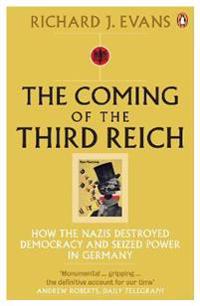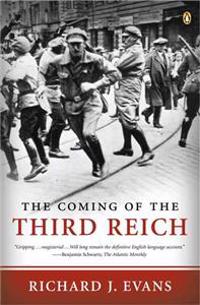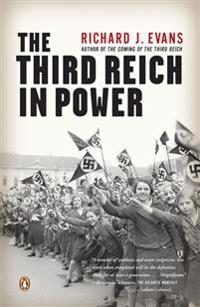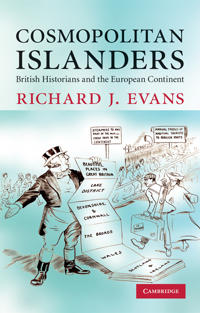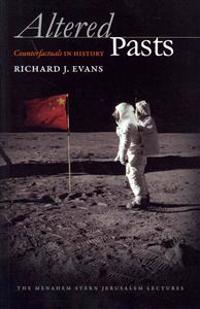Till historiens försvar (Pocket)
avJ Richard Evans
ISBN: 9789185695737 - UTGIVEN: 200811En engagerad och nyanserad plädering för historieskrivningens möjligheter att ge oss äkta insikt om det förflutna.
Denna titel har tidigare givits ut av SNS förlag men ingår numera i Studentlitteraturs sortiment.
[...]The Coming of the Third Reich (Storpocket)
avRichard J. Evans
ISBN: 9780141009759 - UTGIVEN: 200408Richard J. Evans' "The Coming of the Third Reich: How the Nazis Destroyed Democracy and Seized Power in Germany" explores how the First World War, the Weimar Republic and the Great Depression paved the way for Nazi rule. They started as little more than a gang of extremists and thugs, yet in a few y[...]
The Third Reich in Power, 1933-1939 (Storpocket)
avRichard J. Evans
ISBN: 9780141009766 - UTGIVEN: 200605The second book in his acclaimed trilogy on the rise and fall of Nazi Germany, Richard J. Evans' "The Third Reich in Power: How the Nazis Won Over the Hearts and Minds of a Nation" explores how Hitler turned Germany from a vibrant democracy into a one-party state. Before Hitler seized power in 1933,[...]
The Third Reich at War (Storpocket)
avRichard J. Evans
ISBN: 9780141015484 - UTGIVEN: 200909The final book in his acclaimed trilogy on the rise and fall of Nazi Germany, Richard J. Evans' "The Third Reich at War: How the Nazis Led Germany from Conquest to Disaster" shows how Germany rushed headlong into destroying itself, shattering an entire continent. In 1939 Hitler mobilized Germany int[...]
The Coming of the Third Reich (Häftad)
avRichard J. Evans
ISBN: 9780143034698 - UTGIVEN: 200501The first in a three-volume series, a definitive history of Adolf Hitler's rise to power and the collapse of democracy in Nazi Germany explains why Nazism's ideology of hatred and racism found fertile ground in a country embittered by military defeat and economic disaster following World War I, unde[...]
The Third Reich in Power (Häftad)
avRichard J. Evans
ISBN: 9780143037903 - UTGIVEN: 200610Documents the radical and rapid transformation of Germany in its first year under Nazi rule, exploring how virtually every area of life, from the arts and religion to education and literature, was reordered to comply with the regime's preparations for the war, in an account that also describes the i[...]
The Third Reich at War, 1939-1945 (Häftad)
avRichard J. Evans
ISBN: 9780143116714 - UTGIVEN: 201002An absorbing, revelatory, and definitive account of one of the greatest tragedies in human history
Adroitly blending narrative, description, and analysis, Richard J. Evans portrays a society rushing headlong to self-destruction and taking much of Europe with it. Interweaving a broad narrative o[...]The Third Reich in History and Memory (Inbunden)
avRichard J. Evans
ISBN: 9780190228392 - UTGIVEN: 2015-03In the seventy years since the demise of the Third Reich, there has been a significant transformation in the ways in which the modern world understands Nazism. In this brilliant and eye-opening collection, Richard J. Evans, the acclaimed author of the Third Reich trilogy, offers a critical commentar[...]
What is History? (Inbunden)
avEdward Hallett Carr, Richard J. Evans
ISBN: 9780333977019 - UTGIVEN: 200111To mark the 40th anniversary of this text, this updated volume reviews the state of the discipline at the beginning of the 21st century. Renowned scholars ask and seek to answer Carr's question for a new generation of historians: what does it mean to study history at the start of the 21st century?[...]
Cosmopolitan Islanders (Häftad)
avRichard J. Evans
ISBN: 9780521137249 - UTGIVEN: 200905In Cosmopolitan Islanders one of the world's leading historians asks why it is that so many prominent and influential British historians have devoted themselves to the study of the European Continent. Books on the history of France, Germany, Italy, Russia, and many other European countries, and of E[...]
What Is History?: With a New Introduction by Richard J. Evans (häftad)
ISBN: 9781349665518 - UTGIVEN: 2017-11Since its first publication in 1961 E.H. Carr's What is History? has established itself as the classic introduction to the subject. Ranging across topics such as historical objectivity, society and the individual, the nature of causation, and the possibility of progress, Carr delivered an incisive t[...]
Altered Pasts (Inbunden)
avRichard J. Evans
ISBN: 9781408705520 - UTGIVEN: 2014-03A bullet misses its target in Sarajevo, a would-be Austrian painter gets into the Viennese academy, Lord Halifax becomes British prime minister in 1940: seemingly minor twists of fate on which world-shaking events might have hinged. Alternative history has long been the stuff of parlour games, war-g[...]
The Third Reich in History and Memory (Inbunden)
avRichard J. Evans
ISBN: 9781408706442 - UTGIVEN: 2015-02In this fascinating and enlightening collection of essays, one of the most important historians of our time reflects on the ways our understanding of Nazi Germany have been transformed in the twenty-first century. Richard Evans examines new historical perspectives on the Third Reich, such as showing[...]
Altered Pasts: Counterfactuals in History (Häftad)
avRichard J. Evans
ISBN: 9781611685381 - UTGIVEN: 2014-02A bullet misses its target in Sarajevo, a would-be Austrian painter gets into the Viennese academy, Lord Halifax becomes British prime minister in 1940 instead of Churchill: seemingly minor twists of fate on which world-shaking events might have hinged. Alternative history has long been the stuff of[...]
In Defence of History (Häftad)
avRichard J. Evans
ISBN: 9781862073951 - UTGIVEN: 200101In this volume, English historian Richard Evans offers a defence of his craft. At a time of deep scepticism about our ability to learn anything from the past, even to recapture any serious sense of past cultures and ways of life, Evans shows us why history is possible and necessary.[...]


